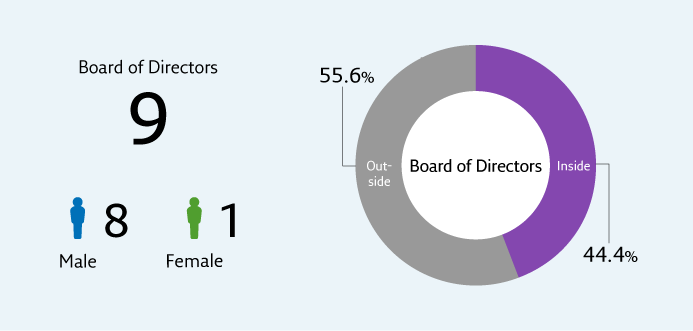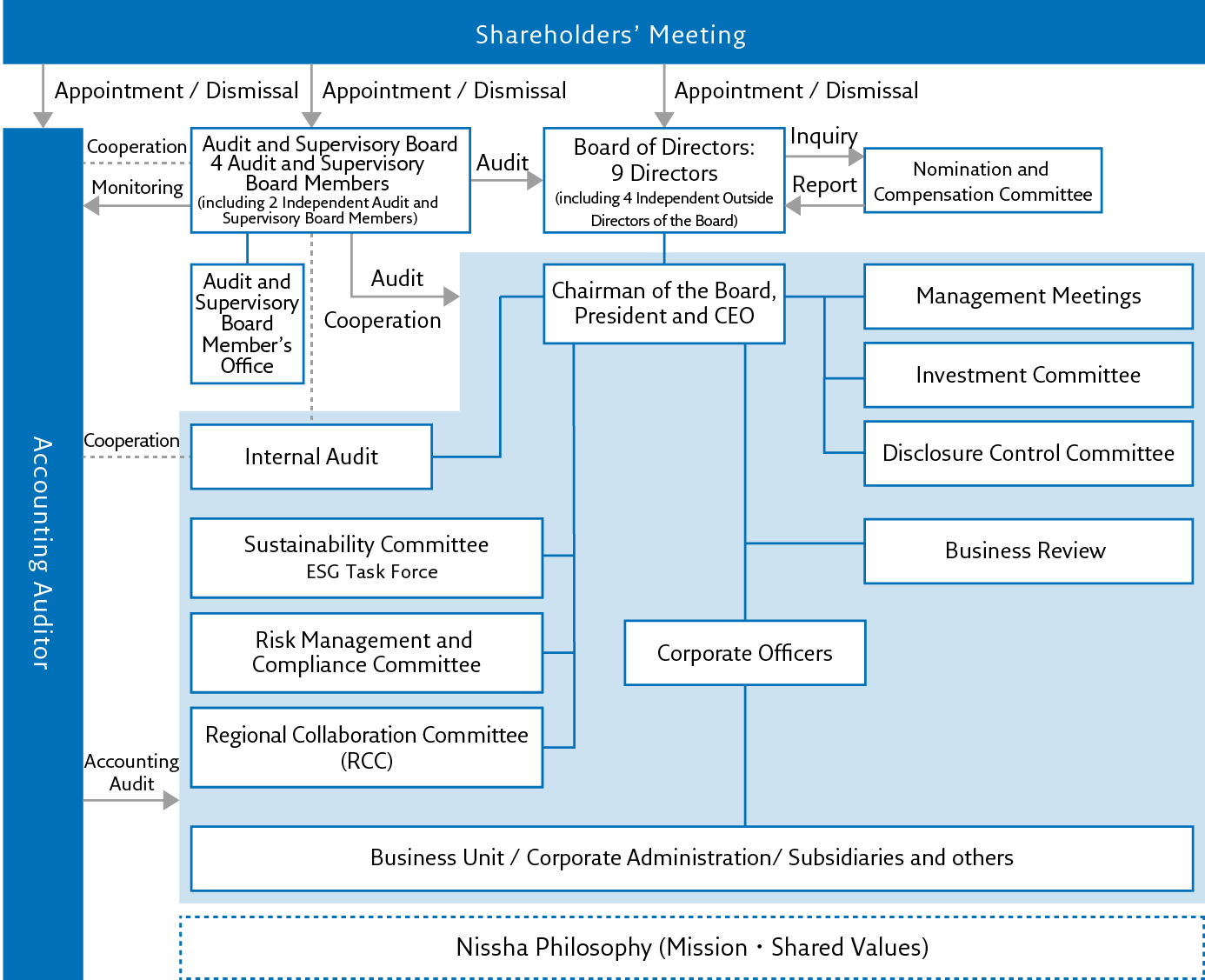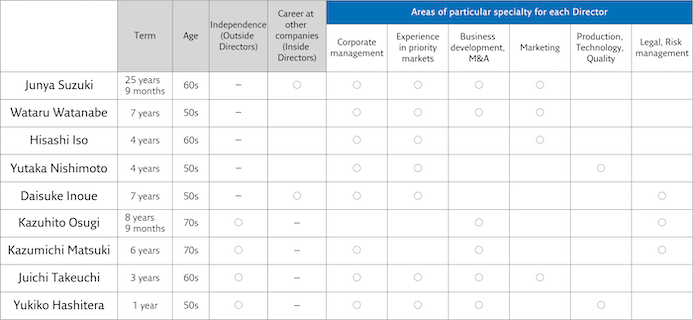- TOP
- Corporate Governance
Corporate Governance
Basic Approach to Corporate Governance
Nissha, since its foundation, has been executing strategies that promptly address external challenges, under committed leadership. The Company believes that strengthening corporate governance along with maintaining such leadership will promote agile and decisive decision making, as well as ensuring management transparency and fairness.
Based on this recognition, the Company places corporate governance as one of the key management issues, strives to maintain and improve it, and seek out sustainable corporate growth and an increase in corporate value over the medium- to long-term. In an effort to clarify the Nissha Group’s basic approach to and policy for implementing corporate governance, in October 2015 we established a Corporate Governance Policy.
Based on this recognition, the Company places corporate governance as one of the key management issues, strives to maintain and improve it, and seek out sustainable corporate growth and an increase in corporate value over the medium- to long-term. In an effort to clarify the Nissha Group’s basic approach to and policy for implementing corporate governance, in October 2015 we established a Corporate Governance Policy.
Evolution of Governance
| 2007 |
|
|---|---|
| 2008 |
|
| 2014 |
|
| 2015 |
|
| 2016 |
|
| 2019 |
|
| 2020 |
|
| 2021 |
|
| 2022 |
|
Diversity of the Board of Directors
Our Board of Directors are appointed taking into account diversity and balance between the experience, knowledge, and skills of the individual to ensure that the Board fulfills its role of making important management decisions and overseeing the execution of duties by Directors of the Board and Corporate Officers.
Management Attribute

The skill set necessary for the Board of Directors, and the values, experiences, and skills in common required for all Directors
We require all Directors to share certain values, experiences, and skills to make important management decisions, exercise high levels of effectiveness in supervising the execution of the Company’s business, and contribute to the enhancement of our corporate value. Moreover, we consider the optimal and balanced distribution of skills (experience and knowledge) among the Board of Directors in those fields that are necessary based on our management strategy to be key for the Board. In addition, those fields will change as the business environment changes.
The Nissha Group has set out Sustainability Vision (Long-term Vision). In line with this, we have formulated the strategies to reach our medium-term vision by backcasting from there to create a three-year Medium-term Business Plan. To achieve these plans, the Company considers the skills (experience and knowledge) in the fields indicated below of particular importance for the Board of Directors.
The following skills matrix illustrates our approach to the values, experience, and skills required of all Directors, as well as the distribution of skills (experience and knowledge) necessary for the Board of Directors as a whole.
The Nissha Group has set out Sustainability Vision (Long-term Vision). In line with this, we have formulated the strategies to reach our medium-term vision by backcasting from there to create a three-year Medium-term Business Plan. To achieve these plans, the Company considers the skills (experience and knowledge) in the fields indicated below of particular importance for the Board of Directors.
The following skills matrix illustrates our approach to the values, experience, and skills required of all Directors, as well as the distribution of skills (experience and knowledge) necessary for the Board of Directors as a whole.
Our Approach to the Values, Experiences, and Skills (Shares Among Directors)
| Global | Directors must have experience in overseas management or other experience and knowledge to recognize management issues from a broad perspective to accelerate global business development. |
|---|---|
| Finance | Directors must have experience and knowledge in finance to improve the profitability and capital efficiency of the business as well as to secure a stable financial base to increase corporate value over the medium to long term. |
| Changes and Discontinuous Growth | Directors must be able to take appropriate risks and branch out into new areas without being bound by preconceived notions to adaptively cope with changes in the business environment and ensure the survival and development of the business. |
| Long-Term Strategic Orientation | Directors must have the ability to develop long-term visions and backcasts to formulate strategies aimed at growth through the reorganization of our business portfolio. |
| Communication Skills | Directors must have the ability to ensure mutual understanding and respect through communication to build trust with stakeholders. |
*Term and age are at the conclusion of the ordinary general meeting of shareholders in March 21, 2025.
*The above fields are those where Directors can particularly exercise their specialties based on the experiences, etc., of each member of the Board. It does not show all the experiences, knowledge, or skills possessed by each Director.
*The above fields are those where Directors can particularly exercise their specialties based on the experiences, etc., of each member of the Board. It does not show all the experiences, knowledge, or skills possessed by each Director.
Corporate Governance Structure
Corporate Governance Structure
We have established a corporate governance structure as shown in the figure below.
*as of January 1, 2025
*as of January 1, 2025

The Board of Directors
Our Board of Directors convenes for regular meetings once a month and for extraordinary meetings as needed. The meetings are chaired by the President.
The Board of Directors is responsible for formulating strategies and supervising. Along with making decisions in accordance with the Board of Directors Regulations regarding matters requiring a decision by the Board of Directors in accordance with the provisions of laws, regulations, and articles of incorporation, and on key matters for business management, it also supervises the work of Directors and Corporate Officers.
Our Board of Directors meetings involve brisk, substantive discussions. Independent Outside Directors of the Board draw on deep insight into their respective fields of specialty to provide accurate advice and opinions, contributing to the enhancement of both management transparency and the Board’s oversight functions.
Our Board of Directors has been working on continuous improvements to enhance the effectiveness of corporate governance by conducting an annual analysis and evaluation of the composition, role, and operation of the Board of Directors in the previous year.
The Board of Directors is responsible for formulating strategies and supervising. Along with making decisions in accordance with the Board of Directors Regulations regarding matters requiring a decision by the Board of Directors in accordance with the provisions of laws, regulations, and articles of incorporation, and on key matters for business management, it also supervises the work of Directors and Corporate Officers.
Our Board of Directors meetings involve brisk, substantive discussions. Independent Outside Directors of the Board draw on deep insight into their respective fields of specialty to provide accurate advice and opinions, contributing to the enhancement of both management transparency and the Board’s oversight functions.
Our Board of Directors has been working on continuous improvements to enhance the effectiveness of corporate governance by conducting an annual analysis and evaluation of the composition, role, and operation of the Board of Directors in the previous year.
Nomination and Compensation Committee
We establish and operate a Nomination and Compensation Committee as an advisory panel for the Board of Directors in order to ensure the objectiveness and fairness of the appointment/dismissal of Directors of the Board and the appointment of Audit & Supervisory Board Members, as well as the compensation of the Directors of the Board.
The chair and the majority of the members are selected from Independent Outside Directors of the Board.
The chair and the majority of the members are selected from Independent Outside Directors of the Board.

